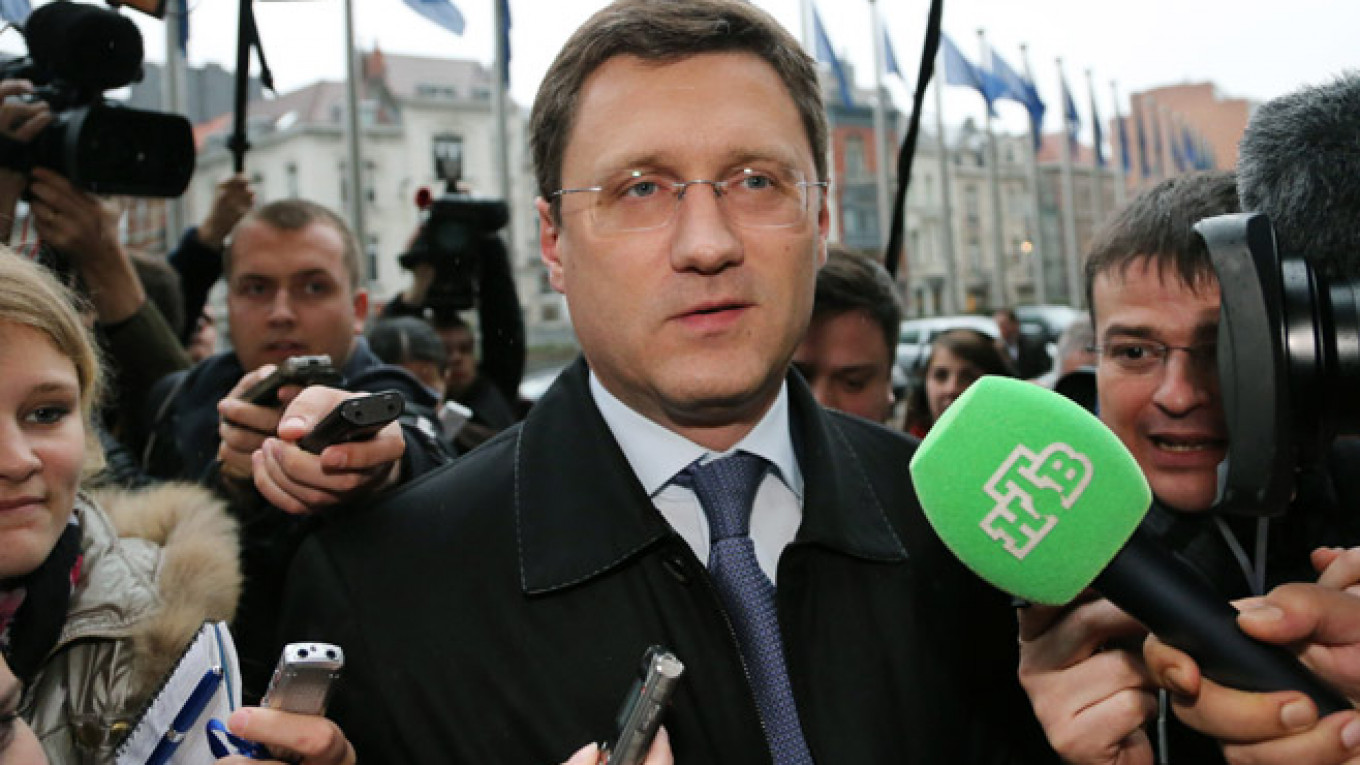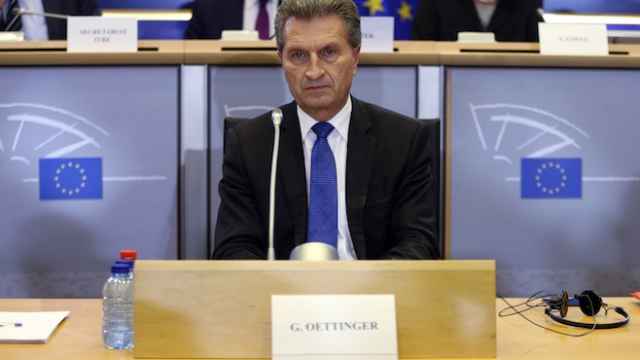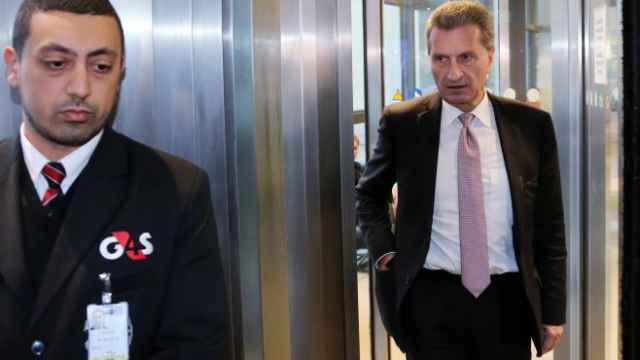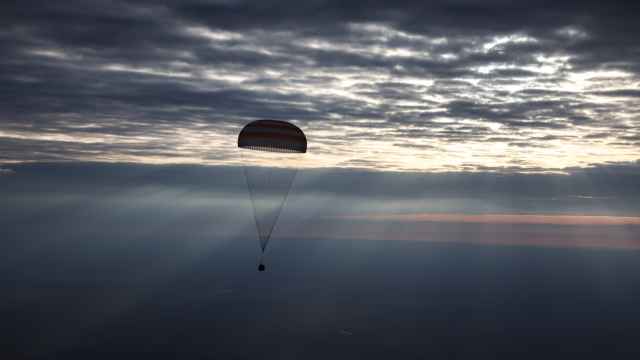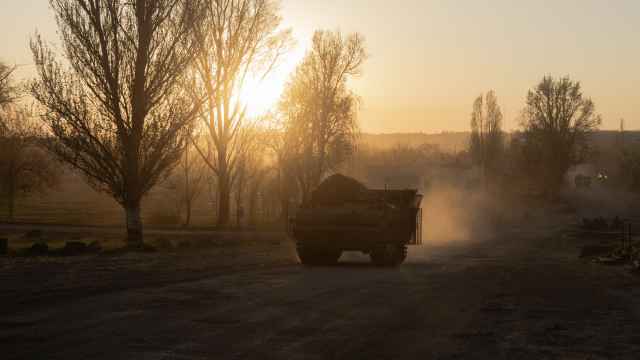BRUSSELS/KIEV — Russia, Ukraine and the European Union were likely to conclude an accord on Thursday that would see Moscow resume natural gas supplies to its ex-Soviet neighbor over the winter, EU and Ukrainian officials said.
Russian negotiators, who broke off three-way talks overnight saying a deal depended on firmer EU commitments to Kiev to help it pay, were flying back to Brussels from Moscow to continue the trilateral discussions in the evening, Russian sources said.
European Commission President Jose Manuel Barroso, in a passing comment during formal remarks ahead of his departure from office on Friday, said: "Apparently we have a deal."
Andriy Kobolev, head of Ukraine's state-run gas company Naftogaz, said: "Today there is a chance of an 'interim winter package' being signed in trilateral format. A high probability."
A source familiar with the Russian negotiators' movements said Energy Minister Alexander Novak and Alexei Miller, the head of state gas firm Gazprom, were flying back.
Russia's TASS news agency quoted a source saying that their return "allows us to hope that an agreement will be concluded."
EU officials said both Russia and Ukraine had bargained hard for commitments from the Western bloc, with Moscow looking for EU cash to help Ukraine pay off debts to Gazprom and the Kiev authorities anxious to get a deal that they could present to domestic voters as not overpaying for vital Russian supplies.
After breaking off the talks in the early hours, Novak and Miller said that an outline accord was in place but they wanted the European Union to guarantee Ukraine's advance payments. Novak said a deal could be signed later in the day.
Ukrainian Prime Minister Arseniy Yatsenyuk said in Kiev that the EU had agreed to serve as guarantor for Kiev in holding Russia to an agreement, notably on the price Ukraine would pay.
Joint documents laying down a common understanding have been prepared and are now with the governments in Moscow and Kiev for approval, the Brussels-based European Commission said in a statement.
Yatsenyuk, citing figures later confirmed by Moscow, said Ukraine would pay $378 per 1,000 cubic meters to the end of 2014 and $365 in the first quarter of 2015. He said Kiev was ready to pay off debts for gas immediately after any deal was signed.
A total of $1.45 billion would be paid immediately and a further $1.65 billion paid by the end of the year, he said.
Novak insisted that Ukraine would still have to pay up front for new deliveries to see its 45 million people through winter. Moscow expects some $1.6 billion for gas to be supplied.
Some critics of Russia question whether its motivation is financial or whether prolonging the wrangling with ex-Soviet Ukraine and its Western allies suits Moscow's diplomatic agenda.
Ukraine is in discussions with existing creditors the EU and the IMF.
German Chancellor Angela Merkel, concerned about Russian gas supplies to the rest of Europe which come via Ukraine, has spoken of bridging finance for Kiev. Russian negotiators said they wanted to see a signed agreement.
Temperatures Drop
The gas cutoff has had little impact for months. But pressure is mounting for a deal as temperatures start to drop below freezing.
European Energy Commissioner GЯnther Oettinger, who has been mediating, leaves office on Friday, making way for a new European Commission.
If he cannot broker a solution, it will be down to his Slovak successor, Maros Sefcovic, who takes office on Saturday.
The two sides came close to an agreement in September, but last week differences were wide.
Weekend elections returned a pro-Western parliament in Kiev, potentially stoking tensions with Moscow, although Russia's EU envoy, Vladimir Chizhov, said Thursday that the mood could be more relaxed now that the vote had taken place.
Ukraine's Naftogaz company has set aside $3.1 billion in a special escrow account to pay the debt.
Kiev says it is working to raise more money from all possible sources of financing, including the EU. The commission is considering Ukraine's request, made last week, for a further loan of 2 billion euros.
Russia provides around a third of the European Union's gas, roughly half of which is pumped via Ukraine.
Ukraine in turn relies on Russia for around 50 percent of its own gas and despite storage has a winter shortfall of around 3 billion to 4 billion cubic meters, depending on the weather.
For Russia, the gas sector contributes about a fifth of the national budget.
Sanctions on Russia, which EU officials decided to leave unchanged on Tuesday while the conflict in Ukraine continues, are sapping an already weak economy.
A Message from The Moscow Times:
Dear readers,
We are facing unprecedented challenges. Russia's Prosecutor General's Office has designated The Moscow Times as an "undesirable" organization, criminalizing our work and putting our staff at risk of prosecution. This follows our earlier unjust labeling as a "foreign agent."
These actions are direct attempts to silence independent journalism in Russia. The authorities claim our work "discredits the decisions of the Russian leadership." We see things differently: we strive to provide accurate, unbiased reporting on Russia.
We, the journalists of The Moscow Times, refuse to be silenced. But to continue our work, we need your help.
Your support, no matter how small, makes a world of difference. If you can, please support us monthly starting from just $2. It's quick to set up, and every contribution makes a significant impact.
By supporting The Moscow Times, you're defending open, independent journalism in the face of repression. Thank you for standing with us.
Remind me later.


